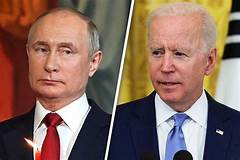
Russian President Vladimir Putin (left) and American President Joe Biden are scheduled to meet in Geneva, Switzerland, on June 16, in one week
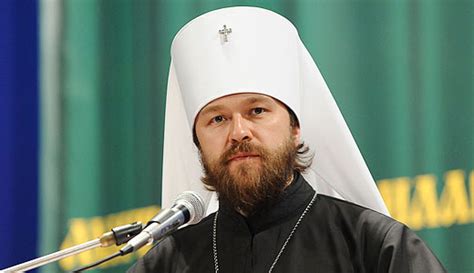
Russian Orthodox Metropolitan Hilarion Alfeyev (above), a key figure in the Russian Church, has spoken in cautiously hopeful terms about the upcoming meeting of the American and Russian presidents
Letter #32, 2021, Wednesday, June 9: Putin-Biden
Looking toward the June 16 meeting in Geneva of Russian President Vladimir Putin and US President Joe Biden, in One Week
“Perhaps the most important thing to say in the current situation is that Russia and the United States, as two great powers, often called superpowers, are directly responsible for maintaining peace in the world.” —Russian Orthodox Metropolitan Hilarion Alfeyev, 54, speaking on a Russian television program three days ago about the upcoming meeting in Geneva, Switzerland, between Russian President Vladimir Putin and Us President Joe Biden. (link) Here is a link to CNN story previewing the meeting (link)
Metropolitan Hilarion: “Russia and the United States are responsible for maintaining peace in the world” (link)
On the eve of a meeting between US President Joe Biden and Russian President Vladimir Putin — scheduled for June 16 in Geneva, Switzerland, a week from today — His Eminence Metropolitan Hilarion of Volokomansk, one of the chief spokesmen of the Russian Orthodox Church, has expressed cautious hope that the meetings can have good results for world peace if the “fragile balances” that have been maintained to date in the “constructive relations” between several important actors — the United States, Russia, China and a number of other countries — are maintained.
“If these balances are maintained, if countries manage to respect their interests, but at the same time do not destroy world peace, then this will probably be the most important fruit of the next meeting of the two presidents and the subsequent negotiations that will take place both at the highest and other levels,” Hilarion said, speaking live on the Sunday, June 6 program “The Church the World” in Russia, answering the question of the presenter of the television channel “Russia 24” E. Graceva about her expectations from the expected meeting of the Russian and American presidents. (link)
By referring to negotiations at the “highest” level, Hilarion is referring to the meeting of the two presidents.
But by mentioning also “other levels,” he is referring to contacts on the cultural, educational, religious and even the “grass roots” levels of travelers and pilgrims — levels where Hilarion himself has played a role in American-Russian relations in recent years.
Russia and the US have “many points of contact”
In fact, Russia and the United States have many more points of contact than it may seem at first glance, Hilarion, chairman of the Department for External Ecclesiastical Relations of the Moscow Patriarchate Metropolitan, said.
“Just remember that we are close: we are separated by the Bering Strait, which is only four kilometers long and which a brave Russian woman swam across,” Hilarion stressed.
Hilarion also highlighted the common Christian heritage: “Not long ago I reread Metropolitan Clement’s book on Orthodoxy in Alaska. How much work our Russian missionaries have done, preaching among the local population! For more than a hundred years the Russian spiritual mission has operated in Alaska and has borne many good fruits.”
Hilarion concluded: “But perhaps the most important thing to say in the current situation is that Russia and the United States, as two great powers, often called superpowers, are directly responsible for maintaining peace in the world.”
***
As head of the External Ecclesiastical Relations of the Moscow Patriarchate, Hilarion is, in a certain sense, the “Foreign Minister” of the Russian Orthodox Church.
His usual role, of course, is on the religious (“ecclesiastical”) level — to oversee relations between the Russian Orthodox Church and other “external” Christian groups, especially the relations with the largest such group, the Roman Catholic Church (hence the interest of his work for Inside the Vatican magazine, which follows the relations between the Vatican and other Christian groups, with particular attention to Catholic-Orthodox relations; see this link to our new Unitas initiative).
Hilarion — who is one of the leading intellectual figures in the Russian Orthodox Church (he attended Oxford as a young man, speaks perfect English, and is the composer of a number of musical compositions which have received considerable critical praise, link) — has visited Rome many times over the past 15 years, sometimes even staying as a guest inside the residence of Pope Francis, the Domus Santa Marta. (Here is an article giving a report on one meeting between Hilarion and Pope Francis, link).
So in the religious sphere, Hilarion has for many years been a key, central figure in the delicate task of establishing and deepening relations between the “first Rome” (Rome) and the “third Rome” (Moscow) (the city of Byzantium, that is, Constantinople, or “New Rome,” nicknamed the “second Rome” — though Hilarion himself never uses these terms, he has noted, see link).
Religious questions, of course, can take on great political importance, and on occasion Hilarion’s remarks on religious matters have had important political connotations.
***
In recent years, Hilarion has been quite publicly critical of what he maintains is the important role of the United States in a religious matter: supporting Greek Orthodox Ecumenical Patriarch Bartholomew‘s decision on January 6, 2019, to grant autocephaly (independence) to the Ukrainian Orthodox Church, which had been under the Russian Orthodox Church for centuries. (Here is an article defending that decision by Bartholomew, link; and here is a sharp critique of Hilarion’s role in this regard by American Catholic writer George Weigel, link.)
Hilarion has stated publicly that this decision is seen by the Russian Orthodox Church as part of an American effort to distance Ukrainian Christians from Russian Christians, and so to increase the division between the two countries politically.
Here is an interview with Hilarion on this matter, link, and here is an interview with a Russian Orthodox scholar, Alexander Shchipkov, a professor of philosophy who is the First Deputy Chairman of the Synodal Department of the Moscow Patriarchate for Relations with Society and the Media, and a member of the Civic Chamber of the Russian Federation, which also takes this line, link.
In this context — in the context of Hilarion’s expressed criticism of some aspects of recent United States policy toward Russia — Hilarion’s cautious words of optimism about a good outcome for peace from the upcoming meeting between President Putin and President Biden take on a certain importance for all who hope that personal encounters and an exchange of ideas even about deeply divisive matters can be helpful to keep open the chances for peace in our world.
Other American Contacts
It seems fitting in this context to point out something that is already known, but has not been widely publicized: that the return to public activity of the Russian Orthodox Church after seven decades of fierce persecution under the declaredly atheist government of the Soviet Union, has been recognized as an important historical shift by many Americans, including former presidents, like George W. Bush, and influential Protestant leaders like evangelist Billy Graham and his son, Franklin Graham.
As part of his duties, Hilarion has met with all of these Americans, attempting to “build bridges” of mutual understanding and trust between Russia and America.
Here is a link to an interesting article about efforts to build ties between American evangelicals and Russia (link).
Here are photos of: (top left) Hilarion speaking at the World Summit in Defense of Persecuted Christians in Washington, on May 11, 2017 (Photo courtesy BGEA); (top right) Hilarion with former US President George W. Bush in Texas in 2010; (bottom left) Hilarion with Billy Graham; and (bottom right) Hilarion with Franklin Graham, Billy Graham’s son, and former US Vice-President Mike Pence.
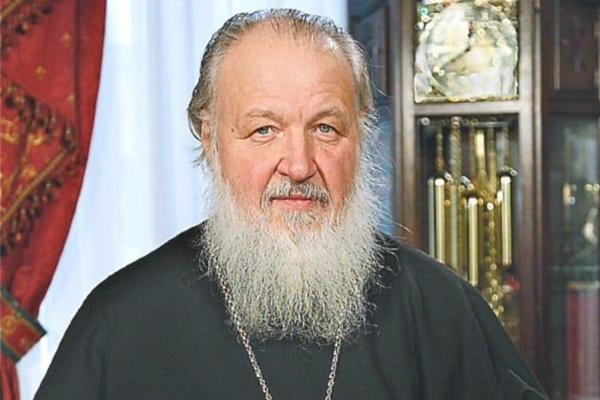
Above, Russian Orthodox Patriarch Kirill, head of the Russian Orthodox Church, which counts an estimated 100 million members. Persecuted during the time of the Soviet Union, the Church has enjoyed support from the Russian government since the fall of the Soviet Union in 1991
Patriarch Kirill on the “Diplomacy” of the Russian Orthodox Church
The following document, from just two weeks ago — May 24, 2021 — sheds light on the work of the “external Relations Department” of the Moscow Patriarchate, of which Hilarion is the head.
Patriarch Kirill, head of the Russian Orthodox Church, was Hilarion’s predecessor in this post, and in an address two weeks ago, Kirill, explained in some detail the work of the “External Relations Department” of the Russian Orthodox Church during the past 75 years, since the time of the department’s founding in 1946 — just after the end of the Second World War.
That was at the moment when the former allies in the Second World War — the US and the USSR — turned into antagonists, setting up the “Cold War” and the “Iron Curtain.”
***
Interlude: A Tribute to US Ambassador Frank Shakespeare
That “Cold War” period ended under the reign of Pope John Paul II (1978-2005) in the years from 1989 to 1991.
It was in the 1980s that John Paul, working in close collaboration with US President Ronald Reagan in an effort that some observers termed a “Holy Alliance” (the title of an article in Time magazine by Carl Bernstein of Watergate fame — Woodward and Bernstein — on February 24, 1992, link), supported the Solidarnosc movement in Poland which some believe was key to provoking the “perestroika” reform movement under Mikhail Gorbachev in the USSR which led eventually to the dissolution of the Soviet Union. on Christmas Day, December 25, 1991.
That collaboration between John Paul and the American president was effectively implemented through the tireless efforts of the American Ambassador to the Vatican at the time, Frank Shakespeare (ambassador from the beginning of 1987 to the middle of 1989, link and link).
I myself interviewed Shakespeare in 1988 for the magazine 30 Days. The interview focused on the efforts of Mikhail Gorbachev to bring about “perestroika” in the Soviet union, and was widely cited in the world press. That interview marked the beginning of my friendship with the ambassador, who became a kind of mentor to me.
In 1989, I was present in the Vatican when Mikhail Gorbachev accompanied by his wife, Raissa, entered the Cortile San Damaso and walked across the courtyard to go up to Pope John Paul II’s apartment in the Apostolic Palace to meet with him.
In a certain sense, that moment, it seemed to me at the time, marked the end of an epoch, an epoch in world history, and also… an epoch in my own life.
For the world, it marked the end of the “Soviet time” and the beginning of the “post-Soviet time.”
For my life, it marked the end of my career as a medievalist, focusing on the events of the 1200s, studying the Calabrian Abbot Joachim of Fiore and his influence on the early Franciscans, studying the life of Francis of Assisi and the thought of St. Bonaventure and the beginning of an immersion into the struggles and achievements of our time.
Essentially, it marked the beginning of a now 35-year effort to understand what has happened to the Christian faith, the Catholic faith, in a “post-Christian” age, an age of astonishing technological development, but also an age when the entire realm of metaphysics has been set aside as useless and irrelevant, leaving our global culture bereft of the traditional tools which brought the human soul and the human mind of prior ages into a fruitful relationship with the good, the true and the beautiful, understood from the time of Plato as the most real and true and highest things of all.
It has also been a 35-year effort to understand the role of Russia, the former Soviet Union, of atheist communism as a system of thought, in this age.
In the late 1990s — precisely in December 1999 — I traveled with Ambassador Shakespeare on a trip to Russia for three weeks.
The centerpiece of the trip was the re-consecration of the Catholic cathedral of Moscow, the Cathedral of the Immaculate Conception of the Holy Virgin Mary (link) which had been taken from the Church by the Soviet government in the 1920s, turned into an office building, and was only returned in the 1990s.
On that occasion, I met Metropolitan Hilarion, a young archimandrite (not yet a bishop) for the first time.
Shakespeare, 94, is a Roman Catholic, and he served in the 1970s as the US ambassador to Portugal. He became in those years, along with his good friend from Lisbon, Antonio De Heredia, who has since passed away, a frequent visitor to Fatima, the place of the 1917 apparitions of Our Lady to the three shepherd children.
Shakespeare, with regard to Russia, and Fatima, became a mentor to me.
He encouraged me to focus my attention on the great issues of faith, or lack of it, in the post-Soviet world (in the East) and in the post-Christian world (in the formerly Christian West).
[End Interlude]
The Unitas Initiative
And this is part of the reason that now we have launched the Unitas initiative — to restore in our culture a sense of, a knowledge of, a love of the transcendent, the holy, the Word of God, Jesus Christ.
This work is inspired by the thought of, among many others, Pope Benedict XVI (link), Don Luigi Giussani (link), Walker Percy (link), of G.K. Chesterton (link), Rudolph Otto (link), and John Henry Newman (link).
The aim is to endeavor in every way possible to keep open access to “that which is above” (link) and so to give hope to a mankind now being offered instead the hope of “transhumanism” (link) and a “Great Reset” where utility, and not holiness, seems to be the disappointing ideal.
Unitas will therefore work to rekindle that “nostalgia,” that “longing for the return” which leads finally to an encounter with, eventually to union with (unitas) that Person who answers all human longing, while, in the process, working for unity (unitas) within the increasingly fractious Catholic Church, and attempting, slowly, to “build bridges” as a way to prepare for the eventual reunion (unitas) of the Catholic Church and the Orthodox Churches, and in in this way to help reach the long-desired goal that the Church breathe with her two lungs, East and West, Greek and Latin, Orthodox and Catholic, as Pope John Paul II often said he hoped would come to pass. (link)
We would be grateful if you would consider joining with us in this work. —RM
Below, American Ambassador to the Holy See Frank Shakespeare with US President Ronald Reagan and Pope John Paul II in the late 1980s
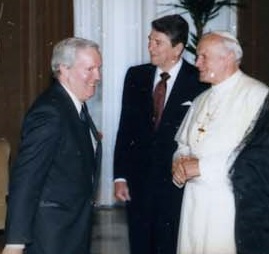
Address by His Holiness Patriarch Kirill on the occasion of the 75 the anniversary of Moscow Patriarchate’s Department for External Church Relations (link)
His Holiness Patriarch Kirill of Moscow and All Russia congratulated Metropolitan Hilarion of Volokolamsk and the staff members of the Moscow Patriarchate’s Department for External Church Relations on the 75th anniversary of the foundation of this Synodal institution.
Your Eminences!
Dear staff members of the Department!
Dear brothers and sisters!
Christ is Risen!
With these joy engendering words I cordially greet you all and congratulate Metropolitan Hilarion of Volokolamsk and the staff members of the Moscow Patriarchate’s Department for External Church Relations on a significant date – the 75th anniversary of the foundation of this oldest Synodal institution in the Russian Orthodox Church.
In the distant 1946, when for a brief period of time the state policy of godless authorities regarding religious organizations somewhat softened, there appeared a possibility for the Church to establish an administrative body for its relations with the outside world. No one could have imagined then what role the Department would play for the future life of the Church.
For the past three fourths of a century our state and society have seen many fast-going changes, and all this time the Department has been defending our church frontiers playing a highly important role in building up relationship of our Church with the authorities and people in the countries of our canonical responsibility, as well as with the leadership of other states, with our compatriots abroad, with Local Orthodox Churches, with non-Orthodox world and representatives of other religions. The activity of the Department was taking different forms, and its staff was growing, but the goal remained unchanged. The Department’s ministry has always been dedicated to the edifying of the Body of Christ (Eph 4:12). This is not just a metaphor. Preserving and strengthening the unity of the Holy Catholic and Apostolic Church, defending its canonical foundations as well as taking care of the purity of the Orthodox doctrine have always been high-priority tasks for the Department.
I worked at the DECR as its chairman for almost two decades, while my involvement in the external affairs of the Russian Orthodox Church started more than half a century ago, in 1968. I can say with certainty that the Department for External Church Relations is of strategic importance for the Russian Church as a whole. Its leading role in the modern history of our Church and in its revival is difficult to overestimate.
It has never been an easy task to proclaim the evangelical truth to the world and to preserve the apostolic faith. Christians have to avoid two extremes: on the one hand, not to conform to the spirit of this world, so as not to be subjugated to it in the end, and on the other – not to shut off from the world to which the Church is called upon to bring the good news. For Christianity, both self-isolation and the way of compromise are fatal.
As early as it goes, the Old Testament describing the duties of priests of the Jerusalem Temple, most of whom were the descendants of the Tribe of Levi, mentions that some leaders of the Levites were over outside works of the house of God (Neh 11:16; 1 Chr 26:29). As for the Church of the New Testament, communication with the outside world is a distinct part and parcel of the mission.
Orthodox witness implies an all-sided coverage of people’s life, both in its personal and social dimensions, so that all other people may seek the Lord (Acts 15:17). Today this witness does not only consist in conveying the church assessment of modern worldwide trends of development to the leadership of different countries, not only in the appeals to take care of the authentic national spiritual life foundations of people that define their identity and determine their self-awareness or to raise their voice against the spreading of sin while defending absolute moral principles in the world, but also consists in the service for the good and edification of people all over the world (Rom 15:2)
Joining our efforts in different spheres of this witness both with other Christian confessions and non-Christian religions and remembering the words of the Saviour that whoever is not against us is for us (Mk 9:40), our Church seeks to manifest the spiritual power of the apostolic faith and the Holy Tradition, the continuity of which is upheld by Holy Orthodoxy. This activity is especially relevant now when Christians all over the world have been called upon to meet the difficult challenges of our time together. The most important is the fact that the content of the witness of our Church never changes. Changing is time alone, which is why the apostle makes it a point for us to walk in wisdom toward them that are without, redeeming the time (Col 4:5). The necessary prudence is expressed in the ability of Christians to adapt to current circumstances. It is gratifying that the Department’s staff members are always ready to follow this important rule carrying out their mission and helping millions of people get to know the truth of Orthodoxy.
***
I recall with gratitude the former DECR heads. I would like to give prominence to the first two who by their tireless sacrificial labours had laid the foundation of the current multilateral large-scale activities of the Department. These are the founder of the DECR and its first chairman, Metropolitan Nikolai (Yarushevich) of Krutitsy and Kolomna, and his successor, Metropolitan Nikodim (Rotov) of Leningrad and Novgorod. These hierarchs had built the Department which later used to carry an uneasy burden of structuring relations between the Church and the state and between the Church and society.
One cannot help recalling the other two DECR chairmen – the now living Metropolitan Juvenaly (Poyarkov) and the recently deceased Metropolitan Philaret (Vakhromeyev). They had made a weighty contribution to the strengthening of Christian solidarity, social justice and good-neighbourly relations among nations.
Our Church was fated to live through the collapse of the Soviet Union, the disruption of the long-held public relations, and divisions that followed. The period of my chairmanship of the Department coincided with the most difficult time of political and governmental crisis. As I recall those years I come to the conviction that we had managed to endure them and keep the integrity of our Church by God’s grace and thanks to the intercession and prayers for our land of the assembly of the new martyrs and confessors of the Russian Church, to the faith of people and their responsibility for the destiny of future generations.
We live at the time of Church revival and new challenges, including the most acute and burning ones – the split of world Orthodoxy made by the Patriarch of Constantinople and the emerged necessity in additional efforts for upholding the integrity of our Church. The interference of politicians in church affairs that we have seen in Ukraine, an attempt to destroy unity of the Russian Church for geopolitical gains and immediate advantages is a crime against people living now and against future generations. This unity is a historical fact and the most important and integral component of spiritual and cultural community of the fraternal people – Russians, Ukrainians, Byelorussians, Moldavians, Latvians, Estonians, and many others.
The defense of persecuted Christians all over the world, but above all in the Middle East and Africa is increasingly in demand today. I am confident that the Russian Church in cooperation with other Christian confessions and religious communities will continue to raise its voice in defense of the persecuted Christians both in dialogue with political, religious and public leaders and at the venue of various international, governmental and public organizations, reminding the world of the real situation of our suffering brothers and sisters.
***
Among the tasks confronting our Church in the field of foreign relations I am bound to mention the following:
— Standing up for Gospel values in the civilized global space;
— Efforts for overcoming divisions in the family of the Orthodox Church;
— Further development of relations with Christian communities all over the world, from which the history of the Department has begun and which is the important dynamic part of its work;
— Active involvement in the work of inter-Christian organizations necessary for conveying our position to the broad world public;
— Coordination of common work with the state structures aimed at the support of our compatriots living abroad;
— Consolidation of common efforts with other religious communities in defense of the moral dimension of social life;
— Participation in civil society dialogues, which is a youngest direction for foreign ministry of the Russian Orthodox Church.
— Faced with manifold tasks in the sphere of international relations, the DECR strives to remain a multifunctional and efficient church body and at the same time intensify its work and upgrade it quality, seeking new forms and means of witnessing in order to go by the new and living way (Heb 10:20), promptly and adequately respond to emerging challenges, develop unconventional approaches, determine clear priorities, provide new perspectives, and find fresh opportunities. Every new epoch requires special commitment. May God grant the current generation of the DECR staff members to respond to today’s challenges just as successfully as their predecessors.
***
The Department for External Church Relations, the people employed therein are always dear to my heart, and the agenda of this church institution has a prominent place in my own agenda. With satisfaction I note the DECR’s constantly increasing efficiency. I appreciate the help I receive from the DECR in carrying out my Patriarchal ministry and thank all those who used to work or are working now in the sphere of external church relations – hierarchs, pastors, theologians, and church officials. Your labour is not in vain in the Lord (1 Cor 15:58), and your contribution to building up our Church and defending its frontiers is hard to overestimate.
To conclude my address, I would like to express my firm belief that the Department for External Church Relations will continue to bear much fruit in serving the Lord.
I wish God’s help to you, dear Vladyka, and to all those labouring at the DECR in the demanding service. Please continue to work faithfully in building up the church life and remain zealous warriors of Christ, mindful that our speech and proclamation were not with plausible words of wisdom, but with a demonstration of the Spirit and of power (1 Cor 2:4).
I invoke the blessing of the Risen Lord upon you and your labours.
+KIRILL, PATRIARCH OF MOSCOW AND ALL RUSSIA

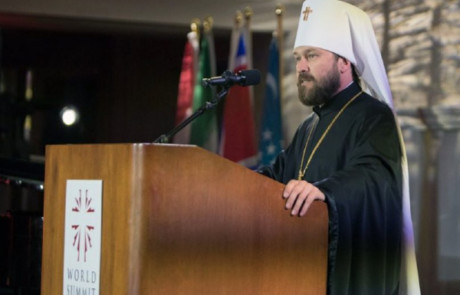
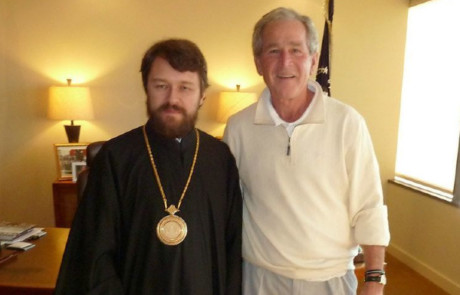
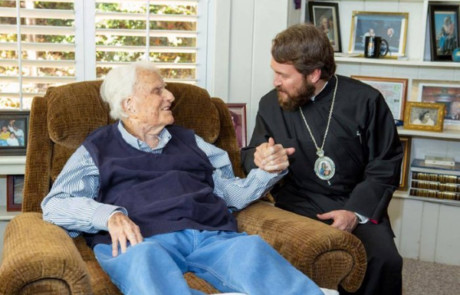
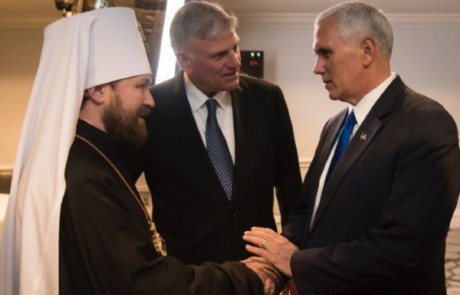




Facebook Comments